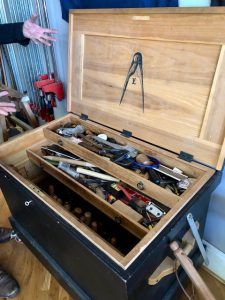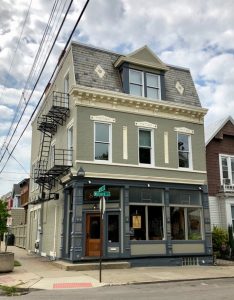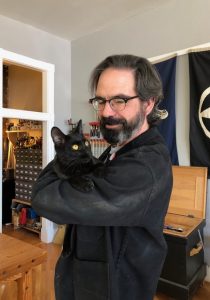By Ginger Dawson
NKyTribune reporter
I am a firm believer in the idea that a human being’s first earthly experiences have an indelible, often unpredictable, impact on what follows. These early matters set a tone and forge a path. It’s an interesting thing to see.
Sometimes, the path branches off in detours. These, however, are an important part of hitting the main drag.

Chris Schwarz in the storefront workshop of Lost Art Press. (Photos by Ginger Dawson)
Christopher Schwarz is the son of a particularly industrious pair of hippies.
The late 60s, an era of counter-cultural impulses, was a ripe time for the back-to-the-land movement and the Schwarz family were keen to be a part of it.
After Chris was born in St. Louis, Missouri, he and his parents relocated to a farm in Hackett, Arkansas — off the grid.
It was old-school homesteading. No electricity and a house to build. A 19th-century, self-sufficient, existence.
Chris’s father Paul built a house for the family and did it all with hand tools: shovels, hammers, handsaws, chalk lines, a plumb bob, brace and bit (a hand drill)—not a power tool in the place, of course. Creativity and a healthy dose of practicality substituted for electricity.
When Chris was old enough, he was taught how to use these tools.
It turned out that he was good at it and very interested in it. He built his first workbench at the age of eleven. Woodworking was a part of his childhood and, to him, it was a normal thing to do. It was not the suburban childhood of most of his peers.
Life went on. Chris grew up on the farm in Arkansas and went off to college at Northwestern University in Evanston, Illinois to study at the Medill School of Journalism. He graduated with a Bachelor of Science in Journalism in 1990.
While he was at Northwestern, he met his wife, Lucy May, who was a fellow journalism student.
In 1993, two good things happened — he got his Masters in Journalism from Ohio State, and he and Lucy married.

The anarchist’s personal tool chest. Everything needed to buld a piece of furniture is in here.
Settling in Lexington, Chris became immersed in covering state government in Frankfort, where he helped launch a bi-weekly newspaper and edited a weekly political newsletter, among other things. He even taught a bit at the University of Kentucky.
He was also taking a woodworking class and making some furniture.
In 1996, Lucy accepted a job at the Cincinnati Enquirer. This meant relocation. This also meant that Chris needed to look for a job.
The perfect thing happened. There was a position available as managing editor for Popular Woodworking, a national magazine published by F+W Media, Inc. in Cincinnati. Naturally, he got the job.
The straight journalism detour had ended and Chris got back on that early path with wood and tools.
Being the editor of Popular Woodworking was his dream job. He was involved with the magazine for 16 years and continued on with a blog he had established for them a while longer.
Always having outside projects of his own (woodworking, music, cooking, etc…), he was also writing a book entitled Workbenches: From Design & Theory to Construction & Use.
F + W published the book and encouraged Chris to set up a website to promote and sell it, which he did. At that time, he also decided to establish a small publishing company to accompany this endeavor. Harkening to the thought that working wood solely with hand tools was becoming a disappearing skill, the name Lost Art Press was chosen.
Three years later, Lost Art Press released another book of Chris’— The Anarchist’s Tool Chest. This proved to be a great success. It was so good, he realized that he could quit his job and become his own boss. This was a welcome revelation.

Lost Art Press headquarters, 837 Willard St. in Covington
Now, one important thing to know about Chris, aside from his woodworking skills, is that he is intellectually voracious. He studies all manner of history — social, political, economic — just about anything that fuels a very personal life philosophy that eschews much of the normal attitudes of life in the 21st century.
The anarchy in The Anarchist’s Tool Chest refers not to the volatile, sometimes violent, form that has fueled much upheaval over the course of European history — as in the Jacobin terrors of the French Revolution. It references to a rather more nuanced American sort of anarchy.
American anarchy according to Chris’s definition “has been best described as a “tendency” toward individual action. It is a reluctance to engage with large governments, corporations, churches or organizations.” It is a belief centered on the concept of private property—self-sufficiency, the ability to own one’s own tools and own the benefit of one’s actions.
This idea was fostered during the early nineteenth century by, among others, Josiah Warren. He was an early individualist who arrived at his philosophies through the successes and failures of the utopian communities that he engaged with.
It is interesting to note that Warren had a history in Cincinnati with his business pursuits, one of which was a “labor-for-labor” store — a store which operated on a type of barter system. Labor, instead of money, was exchanged for goods.
Life comes full circle. This takes us back to that farm in Hackett, Arkansas.

Original 18th century texts by French master André-Jacob Roubo. Lost Art Press has translated these from French to English and published them. Woodworking, furniture building and joinery are covered.
Lost Art Press has evolved into a much bigger idea from its original founding—one that is firmly grounded in Chris’s philosophies of how a life/business should be conducted.
Quality of craftsmanship, respect for people, accountability, good work ethics and the rejection of a consumerist ethos are the foundations.
When I asked Chris what his favorite quote was (surely this man has a favorite quote), it is the paradoxical title of the prologue of The Anarchist’s Tool Chest — “Disobey me.”
At the beginning of a 493-page book that dispenses information, opinions and advice about every facet of working with wood using hand tools — all very thorough and very well thought – out by virtue of first-hand experience and research — you are teased to ignore it all and, well, THINK FOR YOURSELF. Anarchy!
A move to Covington in 2015, enabled Chris and Lost Art Press to expand the book publishing business.
Books by Chris — his own work and also translations and/or reprints from historic texts are produced, as well as the work of 25 other authors.
This business, through Chris’s reputation, has a world-wide following and Lost Art Press ships 30,000 books a year.
The move to 837 Willard St. in Covington also gave Chris a beautiful studio to work in. The main workshop is in the storefront of the building and it is bathed in perfect natural light.
The furniture that Chris enjoys making himself are Welsh stick chairs, campaign chests, workbenches, and tool chests.
He will also design furniture for clients.
Woodworking classes are also conducted at the Covington location. Students come from all of the world: Australia, New Zealand and Germany, to name a few. These are small, six-student classes which include plenty of time for personal instruction.

Chris and Bean, the three-legged Lost Art cat.
Lost Art Press has also branched out into tool design and manufacturing under the name “Crucible Tools” and also produces a small line of clothing.
All books, tools, and clothing are American made by small independent businesses. Participating in a reciprocating, supportive small market economy is an important part of Lost Art Press’s business plan.
In my opinion, one of the biggest draws at the Lost Art Press workshop is Bean the three-legged cat.
When I visited, I was invited in to have a seat. Immediately, I was accosted by this little stinker. I was attacked with such affection and enthusiasm that I didn’t even notice he had only three legs! Cats can always spot a mark. I must smell like an all-day sucker.
With all of this accomplishment, which is still growing, I asked Chris what he was most proud of in his life.
He and Lucy have two daughters, Madeline, 23, and Katherine, 18. These two are his proudest achievements. They are successfully launched.
He has shown them a few pointers on woodworking and remains hopeful that someday they will acquire some of his passion for it, he acknowledged with a touch of resigned humor.
Early paths can be unpredictable. These two may end up making furniture, yet. You never know.
Ginger Dawson writes about the People of NKY — the neighbors you need to know and people you need to meet and understand. The feature appears periodically at the NKyTribune. If you have ideas for subjects please share them with Ginger at ginger@fuse.net.
























